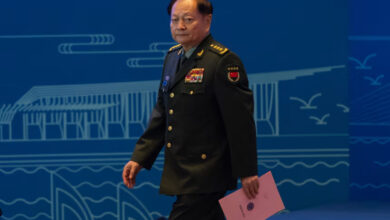There are rumors of an impending military coup in Egypt, especially after Vice President Omar Suleiman’s warning earlier this week that such a fate is the alternative to reforms under Mubarak. Some have called for an end to the protests, arguing that the limited reforms announced by the regime require Mubarak to remain in power in order to enact constitutional amendments, which only the president is authorized to make.
This argument is deceptive. Real constitutional reforms do not just require a president, but also fair elections and referendums, both of which the regime cannot offer. The ruling elite does not appear willing to accept the uprising’s most democratic demands. They have rejected calls for an end to Mubarak’s authoritarian regime. Suleiman explained in a recent interview with ABC News that Egyptians did not yet have a “culture of democracy.” He later retracted these words.
The regime’s reform plan is dubious. There is no political will and the proposed reforms do not meet the minimum demands of the demonstrators.
The alternative to the regime’s current path is a military coup. The army might partly side with the uprising and institute some measures to give it temporary legitimacy. This would be followed by steps to purge the most corrupt elements of the regime, followed by the drafting of a new constitution. A military coup in this sense would mean Mubarak’s ouster and dealing with the uprising through extra-constitutional means. It would require an agreement to be forged between various opposition groups, including those that did not participate in the uprising and who stand to gain from the status quo and the forces behind the revolt.
This option is complicated from the perspective of the ruling elite. There may be other leaders within the regime–not just Mubarak—who must be confronted. Moreover, rebuilding the Egyptian state with a new constitution requires that the military adjudicate between those who benefit from the existing regime and the forces behind the revolution. It must build a civilian government that is satisfactory to the main forces involved in the uprising.
In both cases, the ongoing uprising remains the main force behind the events. Its genius lies precisely in its lack of political organization. There are no leaders who can be arrested and no organizations that can be targeted in order to silence the revolt. But this can also be a source of weakness. With the exception of the unified call for Mubarak’s resignation, the uprising has lacked common demands that allow anti-regime protesters to decide how many concessions from the regime will be enough. That said, a minimum set of demands seems to be emerging. These include guaranteeing freedoms that allow for the rise of new political forces and an end to emergency rule.
If the regime decides not offer the necessary concessions, it will alienate many people. The alternative will be for the military to engage in a massacre, larger than the one that took place at the hands of pro-regime thugs. This is a risky option because if it fails, it could lead to serious divisions within the military. Even if it were to succeed, this alternative would embarrass the regime. The regime will have shown its true face, as a domestic occupation force that freely justifies the use of violence for self-preservation. In doing so, it will establish a new rule, namely that violence is politics and politics is violence.
Since the mid-1990s, the Mubarak regime has faced a choice between entrenching its authoritarian power through violence, and ceding some space for opposition forces. The first option led to terrorist activities in the past. The second option led to the regime’s loss of face, which helped spur the January 2011 uprising.
Over the last few years, the regime has tried to employ both strategies. It has led organized campaigns of violence by relying on thugs, it has helped instigate sectarian conflict, and, most recently, it caused chaos by pulling security forces off the streets after the 28 January mass demonstrations.
The uprising has proved that such repression based solely on tactical intelligence with the aim of keeping the regime strong—in which Egyptian officials were undoubtedly trained by their foreign backers–is not enough to keep Egyptian society under tight political control.
Most Egyptians have sided with democracy and freedom against dictatorship, corruption and manipulation. This pro-democracy movement will shape the military’s options in the coming days. Difficult choices present themselves as we move forward. This military may act as the last defense for the Egyptian regime, but its legitimacy will be at stake. And the past few weeks have proven that tactical intelligence alone, rather than meaningful steps to address the Egyptian regime’s legitimacy crisis, does not work.
Sherif Younis is a lecturer of Egyptian and European modern history at Helwan University, and a professional translator. He is a member of the edirotial collective of el-Bosla magazine.




